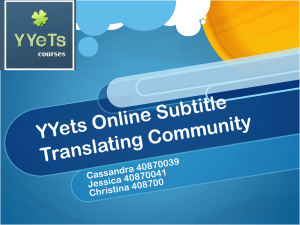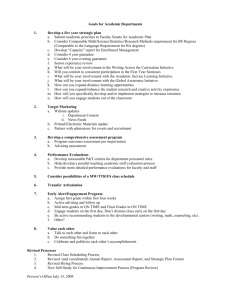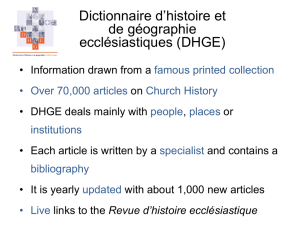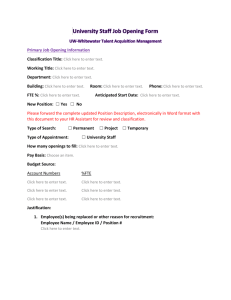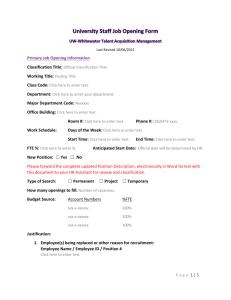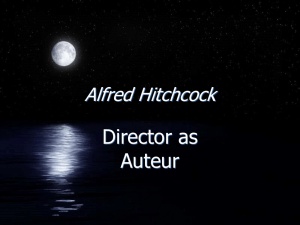EDFOUND 341/POLISCI 341 Urban Education: Issues and Policies
advertisement
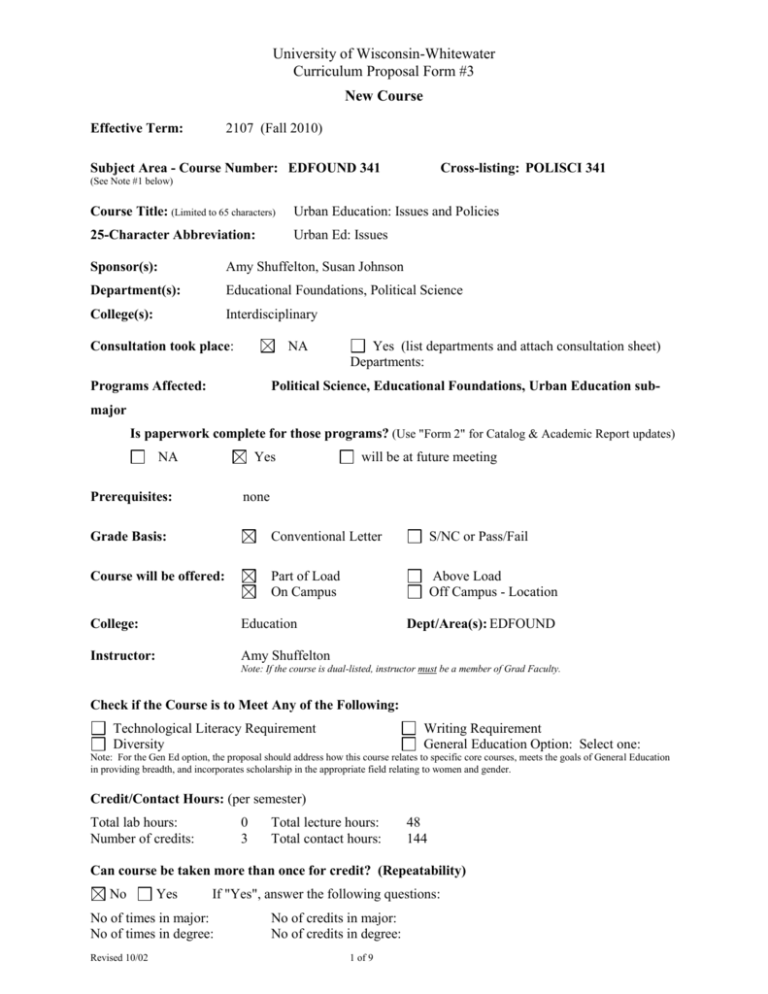
University of Wisconsin-Whitewater Curriculum Proposal Form #3 New Course Effective Term: 2107 (Fall 2010) Subject Area - Course Number: EDFOUND 341 Cross-listing: POLISCI 341 (See Note #1 below) Course Title: (Limited to 65 characters) Urban Education: Issues and Policies 25-Character Abbreviation: Urban Ed: Issues Sponsor(s): Amy Shuffelton, Susan Johnson Department(s): Educational Foundations, Political Science College(s): Interdisciplinary Consultation took place: NA Programs Affected: Yes (list departments and attach consultation sheet) Departments: Political Science, Educational Foundations, Urban Education sub- major Is paperwork complete for those programs? (Use "Form 2" for Catalog & Academic Report updates) NA Yes Prerequisites: will be at future meeting none Grade Basis: Conventional Letter S/NC or Pass/Fail Course will be offered: Part of Load On Campus Above Load Off Campus - Location College: Education Instructor: Amy Shuffelton Dept/Area(s): EDFOUND Note: If the course is dual-listed, instructor must be a member of Grad Faculty. Check if the Course is to Meet Any of the Following: Technological Literacy Requirement Diversity Writing Requirement General Education Option: Select one: Note: For the Gen Ed option, the proposal should address how this course relates to specific core courses, meets the goals of General Education in providing breadth, and incorporates scholarship in the appropriate field relating to women and gender. Credit/Contact Hours: (per semester) Total lab hours: Number of credits: 0 3 Total lecture hours: Total contact hours: 48 144 Can course be taken more than once for credit? (Repeatability) No Yes If "Yes", answer the following questions: No of times in major: No of times in degree: Revised 10/02 No of credits in major: No of credits in degree: 1 of 9 Proposal Information: (Procedures can be found at http://acadaff.uww.edu/Handbook/Procedures-Form3.htm) Course justification: The need for qualified urban teachers and urban policy makers is self-evident. This particular course is necessary for several reasons. For pre-service teachers, it provides an important academic grounding in the socio-economic conditions that create the particular difficulties urban school systems face. As such, the course complements the hands-on experience teachers gain in other courses, and it significantly expands their knowledge and understanding of how student diversity impacts education. Many UW-Whitewater education students go on to work in urban areas; more might if they were explicitly prepared to do so. Ultimately, this course plays a critical role in preparing future teachers to work in the urban areas that desperately need them. As a cross-listed course, Urban Education: Issues and Policies would also offer Political Science students an opportunity to explore an important field of policy. It would serve as an elective for students interested in urban policy, the role of schooling in urban policy-making, and education policy generally. At present, UW-Whitewater has few (if any) courses that bring together future teachers and future policy professionals to study a subject of mutual interest. Teachers and policy professionals both have a great deal to contribute to the making of healthy urban areas, however; and both would benefit from collaboration. A further justification for this course is that it would provide an opportunity for future professionals in different fields to work together and learn from one another, an important professional skill. We are calling this course Urban Education because “urban education” is the widely accepted name for a field within educational and policy studies, but the course will consider issues of relevance to anyone teaching in a school with large numbers of students of color, high poverty, and/or a significant immigrant population – the students usually thought of as “urban” (ditto for policy students). The demographics of South-Eastern Wisconsin, like the rest of the United States, are changing: a generation ago, poor and immigrant students of color were likely to be clustered in urban areas (such as Milwaukee), but this is no longer entirely the case. “Urban issues” (meaning poverty, social and cultural marginalization, and the difficulties these create for schools, families and communities) are spreading into smaller towns, and teachers and policy makers who want to work in areas that are not quintessentially “urban” (e.g. Beloit, Janesville, Delavan, Waukesha) will also find this course useful. Changing demographics make it newly important for UW-Whitewater to offer this course. Relationship to program assessment objectives: This course, taken in combination with Urban Education: Field Experience as well as two other courses in related subjects, enables pre-service teachers to complete the Urban Education Module. The fieldwork course (currently offered as a workshop; we intend to establish it as a new course in the near future) provides in-the-classroom experience that complements the academic knowledge they gain in this class. The module exists as a set of electives, and therefore does NOT affect licensure requirements. It provides students serious about teaching diverse students with better preparation in a number of the relevant Wisconsin Teaching Standards, especially WTS 3, 6 and 10 (relating to student diversity, communication, and community relations). The course takes up some of the issues addressed in Educational Foundations 243: Education in a Pluralist Society, but it treats race, poverty and immigration in an urban context. It is both narrower and deeper than Edfound 243 (which is a more general introduction to diversity in education). For students who want to learn more about teaching diverse learners than a one-semester class can provide, this course provides a more intensive, scholarly look at a subset of issues and the policies enacted to deal with them. In the Political Science department, this course would be an elective. The Urban Education module has been developed and piloted as a workshop class, and it has generated sufficient student interest to convince the Department of Educational Foundations that a regularly offered course would be worthwhile. Budgetary impact: Staffing: For the foreseeable future, the course would be taught by Amy Shuffelton, Assistant Professor in Educational Foundations, as part of course load. Professor Shuffelton has the requisite background and has been teaching this course as a workshop for several semesters. As qualified staff exists, this course Revised 10/02 2 of 9 would not require additional staffing. There are several other faculty members in the Department of Educational Foundations also qualified to teach this course, should that prove necessary. Library, service and supply: the UWW library already has an excellent education collection, which would suffice for the needs of this course. Bibliography is attached and notes books already available at Anderson Library. All current books are available within the UW Library System. Additional materials (current books, audiovisual material, etc.) could be bought with regular Department library funds, which at present are rarely used up. No additional expenses are predicted. Campus Resource Units: No impact No Laboratory or Studio space required. One regular classroom is the only space needed. In sum, no budgetary impact Course description: (50 word limit) This course introduces students to important issues and policies that influence urban schools. It provides a deeper understanding of the difficulties schools, parents, children and teachers face in making American schools a truly equitable institution. The course is suitable for future teachers and policy professionals interested in the social, political and economic factors that shape urban schooling If dual listed, list graduate level requirements for the following: 1. Content (e.g., What are additional presentation/project requirements?) 2. Intensity (e.g., How are the processes and standards of evaluation different for graduates and undergraduates? ) 3. Self-Directed (e.g., How are research expectations differ for graduates and undergraduates?) Course objectives and tentative course syllabus: See attached syllabus. Note: this course will be offered in hybrid format, with hours to be allocated as follows: 22.5 class hours (one class meeting weekly) 22.5 hours speakers, films, podcasts and related online assignments 10 hours exams 24 hours final paper research and writing 60 hours reading, listening to media, watching films (approximately 4 hours per week) 5 hours brief writing assignments This course will meet the requirements for Diversity Credit. Urban schools predominantly serve American minority students, and the course content is 100% focused on urban schooling. Course readings relate to the educational needs and experiences of African American, Latino and other immigrant students. Careful study of urban education is an ideal site for students to gain an understanding that American society has been and continues to be shaped by the interaction of diverse groups, as well as understanding of how group differences are expressed, including cultural practices as well as differences in power or access. Readings, films and other course material to be included in EDFOUND 341/POLISCI 341 encourages students to consider cultural modes of schooling, and assumptions about education, likely to be quite different from those they grew up with. It also encourages students to reflect on their own perspectives on education, and how those relate to the perspectives of urban minority Revised 10/02 3 of 9 students and parents. The course also involves fieldtrips and guest speakers that lay the groundwork for later experience working with diverse people, in diverse environments. (More extensive experience with students is included in a complementary workshop, offered separately.) Bibliography: (Key or essential references only. Normally the bibliography should be no more than one or two pages in length.) See attachment Notes: 1. Contact the Registrar's Office (x1570) for available course numbers. A list of subject areas can be found at http://acadaff.uww.edu\Handbook\SubjectAreas.htm 2. The 15 and 25 character abbreviations may be edited for consistency and clarity. 3. Please submit electronically when approved at the college level - signature sheet to follow in hard copy. Revised 10/02 4 of 9 Our conceptual framework, The Teacher is a teacher preparation program at UW-Whitewater rationale to our operation. It also provides candidate performance, faculty scholarship and education program is committed to reflection upon for pupils; to constructivism in that all learners information and technology literacy; to diversity; Therefore, all syllabi pertaining to courses required Reflective Facilitator, is the underlying structure in our that gives conceptual meanings through an articulated direction for our licensure programs, courses, teaching, service, and unit accountability. In short, our teacher practice; to facilitation of creative learning experiences must take an active role in their own learning; to and to inquiry (research/scholarship) and assessment. for licensure reflect commitment to these Urban Education: Issues and Policies Edfound/Polisci 341 Instructor: Amy Shuffelton Office: Winther 6043 Phone: x5431 email: shuffela@uww.edu This course introduces students to important issues and policies that influence urban schools. It provides a deeper understanding of the difficulties schools, parents, children and teachers face in making American schools a truly equitable institution. The course is suitable for future teachers and policy professionals interested in the social, political and economic factors that shape urban schooling. COURSE OBJECTIVES This course is designed to introduce students to important issues and policies that influence urban schools. It aims to provide a deeper understanding of the difficulties schools, parents, children and teachers face in making American schools a truly equitable institution. The course is suitable for future teachers as well as others interested in the policies, practices, and underlying social, political and economic factors that shape urban schooling. This course will start with the presumption that American schools are not equitable. Substantial research supports this, and course readings present and examine some of it. The question then becomes: Why aren’t they? Smart, well-meaning, energetic people have been trying for years to make schools more equitable – and yet it remains true that socioeconomically disadvantaged, Black, Latino, and other groups of students do less well than their middle class white peers. (The course will critically examine the evidence of this, too.) Course readings and other assignments focus on explanations of inequality, including policy efforts over the years to close the “achievement gap”, including Title I, Head Start, Affirmative Action, No Child Left Behind, and more. One set of answers focuses on money and its distribution. A second set focuses on culture. Running through both sets of claims are arguments about marginalization, and the ongoing effects of America’s history of racial discrimination. This course asks students to look at texts, films, podcasts, and other media that make significant and compelling arguments about these issues. The first half of the course is generally dedicated to exploring policy issues from a social scientific perspective. In the later half of the class, we will take a closer look at the real lives of urban students, in order to better consider how urban educational policy affects real schoolchildren and their families. COURSE FORMAT This is a hybrid course that meets one time weekly, with the second meeting replaced by a variety of activities, including films, campus speakers, online assignments, and independent reading and writing. The University expects that as a 3 credit course, Urban Education will take approximately 144 hours of students’ time. This is allotted as follows: 22.5 class hours (one class meeting weekly) 22.5 hours speakers, films, podcasts and related online assignments 10 hours exams 24 hours final paper research and writing 60 hours reading, listening to media, watching films (approximately 4 hours per week) 5 hours brief writing assignments Revised 10/02 5 of 9 COURSE READINGS 4 books will be available for purchase at the University Bookstore: Class and Schools, Richard Rothstein Children as Pawns, Timothy Hacsi The House on Mango Street, Sandra Cisneros Holler if you Hear Me, Gregory Michie Other readings will be made available electronically. GRADE SCHEMA This course is graded using the new +/- system. Grading as follows: A = 94-100 A- = 90-93 B+ = 87-89 B= 84-86 B- = 80-83 C+ = 77-79 C= 74-76 C- = 70-73 D+ = 67-69 D = 64-66 D - = 60-63 F – 59 and below COURSE REQUIREMENTS AND GRADING 1. Exams: There will be two exams in this course: a midterm and a final exam. These exams will be takehome, open-book exams that test students’ comprehension of the course readings and issues discussed in class, as well as students’ ability to think critically about them. They consist of a mix of short answer and longer essay questions. Each exam is worth 20 % of the final grade. (Total: 40%) 2. Participation has two facets, both counting towards your grade. 1) You are expected to come to all classes with assignments completed, prepared to discuss. If, as sometimes happens, you need to miss a class, you can make up the absence by handing in a 400-600 word response to that week’s reading and/or other media. This is due by a week after the missed class and may not be turned in late. 2) In place of one class each week, a variety of activities are assigned. These include guest speakers, films, podcasts, and independent readings. Written assignments will be attached to these activities. Participation: 30% of final grade Final Research Paper: This assignment is designed to provide students with the opportunity to explore an area of interest to that is related to our study of urban education. Undergraduate students are to write a 1200-1600 word (typed) essay that explores a carefully posed research question on an educational issue. Students will be required to find either one outside resource book (and read the entire book) or three outside resource articles from academic journals or chapters from edited collections AND use two of the readings for class in their exploration of this question. If you have a topic in mind, please suggest it. If you don’t, please ask – your instructor has a lot of ideas. This assignment is to be completed in stages, as follows. Revised 10/02 6 of 9 1. Choose a question and find sources. Proposal due week 7 2. Read the sources and write an annotated bibliography. For the purposes of this paper, an annotated bibliography will consist of a summary of each source, with analysis. Your summary should a) state the main point of the source and b) show what major evidence or arguments it uses to support this point. Your analysis should a) comment on strengths and/or weaknesses of the book or article under consideration and b) explain how the book or article contributes to your project. Annotated bibliography due week 10 3. Draft paper. This is to be a complete, polished draft, which you will submit to your instructor, who will pair you up with a classmate for peer review. It can (and probably should) incorporate your annotated bibliography, but paragraphs need to be carefully linked so that the paper reads as a single continuous text that makes a coherent argument. Due week 13 4. Peer review. Your instructor will provide you with explicit instructions when it is time to carry this out. Due week 14. 5. Final draft. Research paper: 30% Please note: University Policies Regarding Academic Misconduct, Student Religious Beliefs, and Absences: The University of Wisconsin-Whitewater is dedicated to a safe, supportive and nondiscriminatory learning environment. It is the responsibility of all undergraduate and graduate students to familiarize themselves with University policies regarding Special Accommodations, Misconduct, Religious Beliefs Accommodation, Discrimination, and Absence for University Sponsored Events. (For details, please refer to the Undergraduate and Graduate Timetables; the “Rights and Responsibilities” section of the Undergraduate Bulletin; the Academic Requirements and Policies and the Facilities and Services sections of the Graduate Bulletin; and the “Student Academic Disciplinary Procedures” [UWS Chapter 14]; and the “Student Nonacademic Disciplinary Procedures” [UWS Chapter 17].) The College of Education supports the codes of ethics published by relevant specialty organizations. Revised 10/02 7 of 9 COURSE SCHEDULE Introduction: What’s Going on in Urban Schools? Week 1 Introduction Week 2 Savage Inequalities, selections: “Looking Backward”; “Other People’s Children”, “Children of the City Invincible” (ch. 1, 2 and 4) Week 3 podcasts on New Orleans and Washington DC school reform “What it Takes to Make a Student” Podcast report due Money, and Some Policy Responses Week 4 Urban Poverty: some background When Work Disappears, selections (on D2L) Week 5 Socio-Economic Status: How it affects the achievement gap Class and Schools pp 1-83 (intro, chs 1 and 2) Week 6 SES and NCLB Class and Schools, pp 85-147 (chs 3-5 and conclusion) Week 7 Racial Divisions Eyes on the Prize, episode 2 (focused on desegregation in Little Rock and the U. of Mississippi); Little Rock Central: 50 Years Later Week 8 Head Start Children as Pawns, Head Start (intro and ch 1) Week 9 Class Size and SAGE Children as Pawns, Does Class Size Matter? (ch3) Week 10 Wrapping up socio-economics Children as Pawns, Does Money Make Schools Better? (ch 5 and conclusion) Midterm exam due Culture and Urban Education Week 11 Student experiences of urban schooling Holler if You Hear Me Week 12 Student experiences of reform “Expectations: Can the Students Who Became a Symbol of Failed Reform Be Rescued?” Growing up in the City Week 13 Immigration The House on Mango Street Lost in Translation: Latinos, Schools and Society Week 14 Immigration II Up Against Whiteness, selections Week 15 Student presentations Revised 10/02 8 of 9 Urban Education: Issues and Policies Bibliography * indicates holdings in Anderson Library. All books can be found within the UW Library System. Anyon, Jean, Radical Possibilities: Public policy, urban education and a new social movement. (New York: Routledge, 2005) *Ayers, William and Patricia Ford, editors, City Kids, City Teachers. (New York: New Press, 1996) *Ayers, William et al, City Kids, City Schools. (NY, New Press, 2008) *Cisneros, Sandra, The House on Mango Street. (New York: Random House, 1991) Hacsi, Timothy, Children as Pawns. (Cambridge MA: Harvard U Press 2005) *Kotlowitz, Alex, There Are No Children Here. (NY: Random House, 1991) *Kozol, Jonathan, Savage Inequalities. (New York: Harper Perennial, 1992) *Ladson-Billings, Gloria, Dreamkeepers, 2nd edition. (San Francisco: Jossey-Bass, 2009) *Lee, Stacey, Up Against Whiteness. (New York: Teachers College Press, 2006) *Meier, Deborah, Many Children Left Behind. (Boston, MA: Beacon Press, 2004) *Michie, Gregory, Holler if You Hear Me. (New York: Teachers College Press, 1999) *See You When We Get There. (New York: Teachers College Press, 2004) Pattillo, Mary, Black on the Block: The politics of race and class in the city. (Chicago: University of Chicago Press, 2007) *Rothstein, Richard, Class and Schools. (New York: Teachers College Press, 2004) *Wilson, William Julius, When Work Disappears. (New York: Random House, 1997) *There Goes the Neighborhood. (NY: Random House, 2007) Revised 10/02 9 of 9
